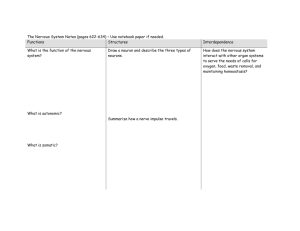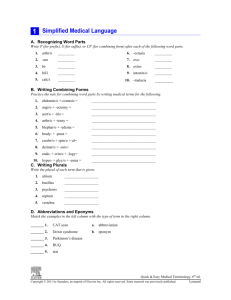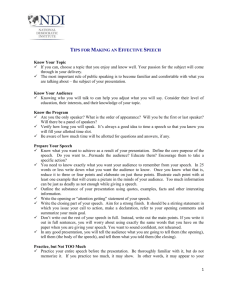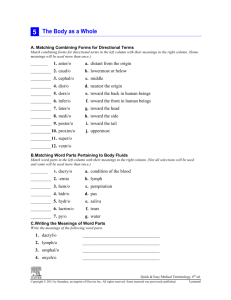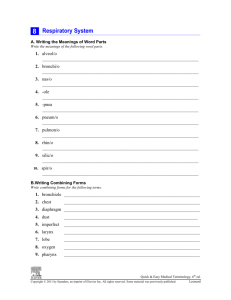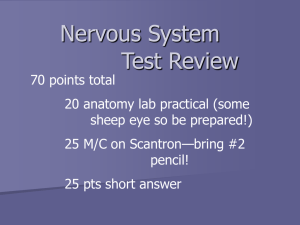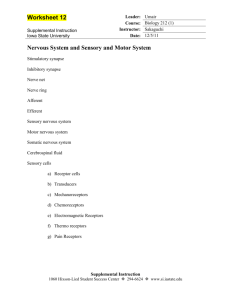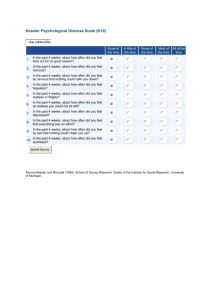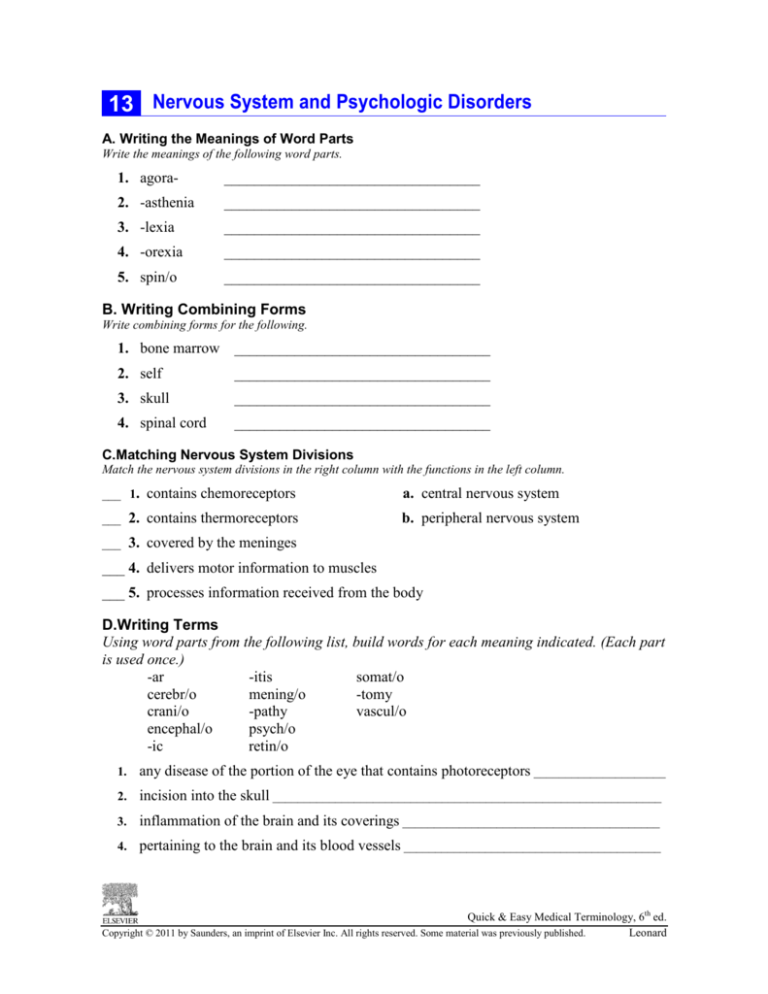
13 Nervous System and Psychologic Disorders
A. Writing the Meanings of Word Parts
Write the meanings of the following word parts.
1. agora-
__________________________________
2. -asthenia
__________________________________
3. -lexia
__________________________________
4. -orexia
__________________________________
5. spin/o
__________________________________
B. Writing Combining Forms
Write combining forms for the following.
1. bone marrow __________________________________
2. self
__________________________________
3. skull
__________________________________
4. spinal cord
__________________________________
C.Matching Nervous System Divisions
Match the nervous system divisions in the right column with the functions in the left column.
___ 1.
contains chemoreceptors
___
2. contains thermoreceptors
___
3. covered by the meninges
a. central nervous system
b. peripheral nervous system
___ 4. delivers motor information to muscles
___ 5. processes information received from the body
D.Writing Terms
Using word parts from the following list, build words for each meaning indicated. (Each part
is used once.)
-ar
-itis
somat/o
cerebr/o
mening/o
-tomy
crani/o
-pathy
vascul/o
encephal/o
psych/o
-ic
retin/o
1.
any disease of the portion of the eye that contains photoreceptors _____________________
2.
incision into the skull ______________________________________________________________
3.
inflammation of the brain and its coverings _________________________________________
4.
pertaining to the brain and its blood vessels _________________________________________
Quick & Easy Medical Terminology, 6th ed.
Copyright © 2011 by Saunders, an imprint of Elsevier Inc. All rights reserved. Some material was previously published.
Leonard
__________________________________ Chapter 13 Nervous System and Psychologic Disorders
5.
448
pertaining to the mind-body relationship ____________________________________________
E.Matching
Match the receptors and cells in the left column with their descriptions on the right.
____ 1. chemoreceptor
a. cell that conducts impulses to or from the nervous system
____ 2. glia
b. cell that provides support and protection to the nervous system
____ 3. neuron
c. receptor for chemical stimuli
____ 4. photoreceptor
d. receptor for heat
____ 5. thermoreceptor
e. receptor for light
Crossword Puzzle
Write a word for each clue.
Quick & Easy Medical Terminology, 6th ed.
Copyright © 2011 by Saunders, an imprint of Elsevier Inc. All rights reserved. Some material was previously published.
Leonard
__________________________________ Chapter 13 Nervous System and Psychologic Disorders
1
3
449
2
4
5
6
7
8
9
10
11
12
13
14
15
16
17
18
19
20
21
22
23
24
25
26
27
28
29
30
Quick & Easy Medical Terminology, 6th ed.
Copyright © 2011 by Saunders, an imprint of Elsevier Inc. All rights reserved. Some material was previously published.
Leonard
__________________________________ Chapter 13 Nervous System and Psychologic Disorders
450
ACROSS
1. the largest and uppermost part of the brain
5. inflammation or degeneration of the peripheral nerves
8. conveying away from a center
9. paralysis affecting like parts on both sides of the body
10. profound unconsciousness
12. injury resulting from impact with an object
13. part of brain that lies just under the cerebrum
15. paralysis of the legs and lower part of the body
18. conducting or conveying toward a center
19. the supporting structure of nervous tissue
20. cerebrovascular accident
21. unequal curvature of the lens or cornea
23. name of the canals in the internal ear
25. nerve process by which impulses travel away from the cell body
26. name of duct that carries tears from the eye to the nose
27. pertaining to tears
28. a passage or bypass between two vessels
29. inflammation of the membranes that cover the brain and spinal cord
30. tough, white, outer coat of the eyeball
DOWN
2. inflammation of the bone marrow
3. cell process that carries impulses toward the cell body
4. transparent anterior part of the eye
6. involuntary part of the nervous system
7. abnormal accumulation of CSF within the skull
11. pertaining to the brain and spinal cord
14. abnormal slowness of muscular movement
16. herniation of part of the brain and meninges through the skull
17. having no feeling or sensation
22. a major mental disorder
24. skull
Quick & Easy Medical Terminology, 6th ed.
Copyright © 2011 by Saunders, an imprint of Elsevier Inc. All rights reserved. Some material was previously published.
Leonard


